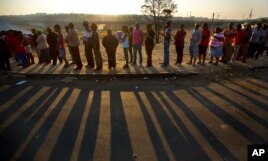08 June, 2014
Unemployment remains high in South Africa. It is one of the greatest problems for the country's youth. So, many young people are starting their own businesses. But not everyone who opens a business is successful.
Job creation was a top goal of the South African government during the first ten years after the end of the policy of racial separation in 1994. However, little progress has been observed in the struggle to create enough jobs.
Officials reported last month that the unemployment rate was 25.2% nationwide. That was up from a rate of 24.1% last year. More than five million South Africans are unemployed. If the people who stopped looking for work were included in the report, the rate would be 35.1%.
Twenty-four year old Sibusiso Ngcobr says he can no longer wait for the government to create a job for him.

South Africans cast their votes in May 7, 2014 elections. The ruling African National Congress returned to power despite concerns over unemployment and corruptions.
"It's hard to find a job. You can't sit and maybe your brains would blast out of your mind, because, like, you can't sit and do nothing. You can't wait, I have to eat, I have brothers to support, I have a family to feed."
Instead, he and other South Africans like him are creating their own companies. But he says the government's attempts to help small-business owners like him -- people with just a basic education -- are hurt by too many rules.
"Coming back from a previously-disadvantaged background, you don't have security, your house is just a small house, and then you go to the bank -- you have a great, brilliant idea, they say they want surety, they want collateral -- what do you have? You have nothing. You can't say ‘I have got my high school diploma, here is it -- you can't say that. So you actually have to start from the grassroots."
Beginning from "grassroots" is what Ludwick Marishane did. As a young man, he started businesses in the northern province of Limpopo -- a place with high levels of poverty. Some of his businesses failed.
But one day, as he and a friend were lying in the sun, he had an idea. His friend did not want to wash up, and wondered why no one had created a product to help those who could not, or did not want to, bathe. A few years later, with little money, Ludwick Marishane created "Dry Bath Gel." It saves time for some, and helps those who do not have use of clean water themselves.
"I scraped (together) whatever, whatever resource(s) I had available. I didn't have a computer or resources like that so I would have to use the local computer café, or internet café, where it cost me about $2 an hour to use the internet in all day. And my allowance per week was about five dollars -- that was my pocket money and lunch money."
In his last year of high school, he wrote an 8,000-word business plan on a simple telephone, and sent it to 80 investors. But none of them would agree to risk their money on a young inventor with a product that they believed mostly helped poor people. So he began looking in other places.
"I looked at different sources -- the different banking loans and the different development loans that government had made available in South Africa for small businesses, and I was unsuccessful -- part of it was the red tape and the amount of bureaucracy involved in trying to access those types of funds and at the same time my business wasn't a bankable idea."
So he entered the product into competitions, and slowly gained investors. Now, Mr. Marishane holds legal rights to his invention. In fact, he is the youngest patent-holder in South Africa.